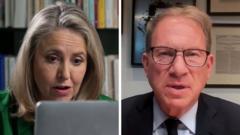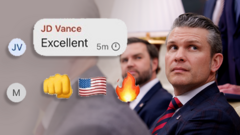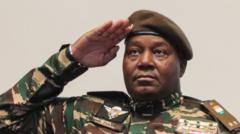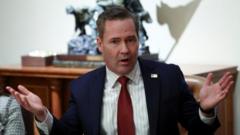Goldberg, who uncovered sensitive information shared by top U.S. officials via a Signal chat, reflects on the attacks he faced from the Trump administration, including disparaging remarks from President Trump and other officials. Amidst the fallout, the security implications and accountability of such actions loom large.
The Fallout from the Signal Chat Leak: Journalist Reacts to Trump's Accusations
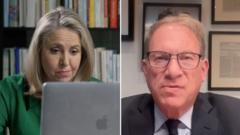
The Fallout from the Signal Chat Leak: Journalist Reacts to Trump's Accusations
An explosive revelation involving a Signal chat group has sparked controversy as journalist Jeffrey Goldberg faces backlash from Trump administration officials.
In what can only be described as a political maelstrom, investigative journalist Jeffrey Goldberg found himself at the center of a significant controversy after the leak of sensitive information shared unknowingly with him by top U.S. officials via the secure messaging app Signal. Goldberg, the Atlantic editor who reported on this incident, relayed his experience in a recent interview, describing the initial invitation to join a group chat featuring senior national security officials, including notable figures like Secretary of Defense Pete Hegseth and National Security Advisor Michael Waltz.
The situation escalated quickly as the Trump administration officials turned their ire on Goldberg, labeling him a "loser" and "sleazebag" for his reporting, while asserting that the information shared was neither sensitive nor classified. In stark contrast, Goldberg emphasized that the details exchanged in the chat, related to an imminent military operation in Yemen, were indeed alarming, characterized by specific timings and potential targets.
Goldberg's unexpected inclusion in the group chat came after he received a message from Waltz, which he initially dismissed as a prank. "I wish there was a spy novel aura around this," he remarked. Yet, once inside, he observed a disturbing exchange that pointed to serious concerns over information security practices among top U.S. officials. Despite Waltz’s claim that he did not recognize Goldberg and that the message was intended for someone else, more complex questions arose regarding the accountability of individuals handling sensitive information.
As the backlash grew from the President and other officials, Goldberg's decision to publish the conversations became a focal point of debate. "When they said there was nothing to see here, and we have the texts, we felt that perhaps people should be informed of the facts," he asserted. The messages purportedly included sensitive operational plans, yet Hegseth maintained they did not qualify as classified material.
This incident has ignited discussions on the preparedness of national security apparatus, especially regarding how sensitive information is communicated. Goldberg did not shy away from labeling the circumstances surrounding the chat as troubling, highlighting discrepancies in accountability within the administration. "If someone at the lower levels committed a similar error, they would likely face severe penalties," he observed.
Following the uproar, Goldberg opted to exit the group chat, a decision that garnered mixed reactions from the journalistic community. He explained, "There are multiple legal and ethical issues at play here," and expressed a commitment to adhere to ethical standards. As pressures mount from both Democratic and some Republican lawmakers for an investigation into the matter, the broader implications for information security and accountability in government operations remain a topic of intense scrutiny.
Ultimately, as Goldberg contemplates the aftermath of this scandal, he finds himself amidst a novel challenge—bridging the gap between press freedom and the demand for accountability from those in positions of power. The tempers of those in command may flare, but Goldberg's commitment to unearthing the truth remains steadfast in the wake of personal attacks.









